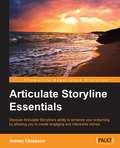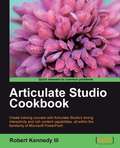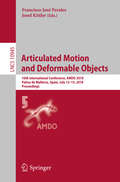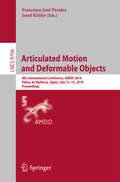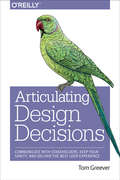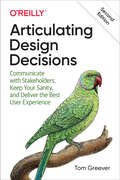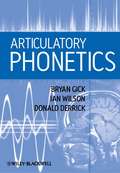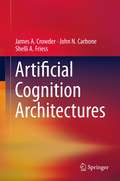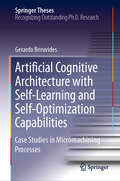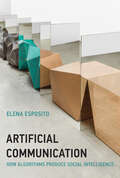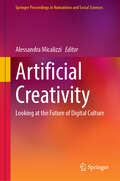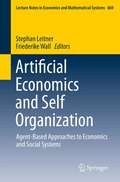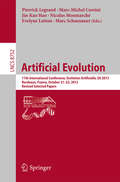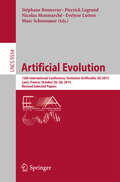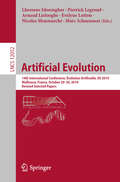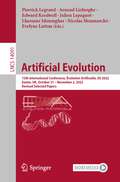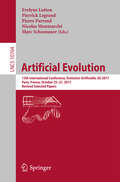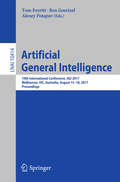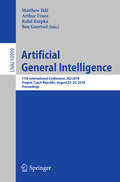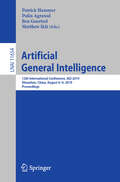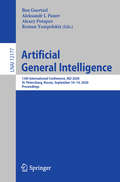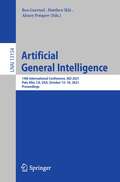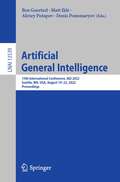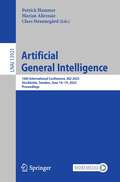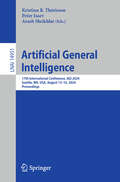- Table View
- List View
Articulate Storyline Essentials
by Ashley ChiassonThis book is for intended for all those interested in working with Storyline to develop engaging e-learning projects. With a user-friendly interface, you don't need any prior experience with Storyline to create and publish your first project.
Articulate Studio Cookbook
by Robert Kennedy IIIThe cookbook style is a series of practical recipes which represent solutions to problems and popular activities in a concise but detailed manner. If you are a beginning developer or just someone who has been asked to be the jack-of-all-design in your training department, then this book is a great starter. Having a working knowledge of PowerPoint is helpful but not essential. By simply following the steps, you will be able to create a clean, professional looking course.
Articulated Motion and Deformable Objects: 10th International Conference, AMDO 2018, Palma de Mallorca, Spain, July 12-13, 2018, Proceedings (Lecture Notes in Computer Science #10945)
by Josef Kittler Francisco José PeralesThis book constitutes the refereed proceedings of the 10th International Conference on Articulated Motion and Deformable Objects, AMDO 2018, held in Palma de Mallorca, Spain, in July 2018.The 12 papers presented were carefully reviewed and selected from 26 submissions. The papers address the following topics: advanced computer graphics and immersive videogames; human modeling and animation; human motion analysis and tracking; 3D human reconstruction and recognition; multimodal user interaction and applications; ubiquitous and social computing; design tools; input technology; programming user interfaces; 3D medical deformable models and visualization; deep learning methods for computer vision and graphics; and multibiometric.
Articulated Motion and Deformable Objects: 9th International Conference, AMDO 2016, Palma de Mallorca, Spain, July 13-15, 2016, Proceedings (Lecture Notes in Computer Science #9756)
by Josef Kittler Francisco José PeralesThis book constitutes the refereed proceedings of the 9th International Conference on Articulated Motion and Deformable Objects, AMDO 2016, held in Palma de Mallorca, Spain, in July 2016. The 20 papers presented were carefully reviewed and selected from 34 submissions. The conference dealt with the following topics: advanced computer graphics and immersive videogames; human modeling and animation; human motion analysis and tracking; 3D human reconstruction and recognition; multimodal user interaction and applications; ubiquitous and social computing; design tools; input technology; programming user interfaces; 3D medical deformable models and visualization; deep learning methods for computer vision and graphics; multibiometric.
Articulating Design Decisions
by Tom GreeverTalking to people about your designs might seem like a basic skill, but it can be difficult to do efficiently and well. And, in many cases, how you communicate about your work with stakeholders, clients, and other non-designers is more critical than the designs themselves--simply because the most articulate person usually wins.This practical guide focuses on principles, tactics, and actionable methods for presenting your designs. Whether you design UX, websites, or products, you'll learn how to win over anyone who has influence over the project--with the goal of creating the best experience for the end user.Walk through the process of preparing for and presenting your designsUnderstand stakeholder perspectives, and learn how to empathize with themCultivate both implicit and explicit listening skillsLearn tactics and formulas for expressing the most effective response to feedbackDiscover why the way you follow through is just as crucial as the meeting itselfEducate your stakeholders by sharing the chapter from this book on how to work with designers
Articulating Design Decisions: Communicate With Stakeholders, Keep Your Sanity, And Deliver The Best User Experience
by Tom GreeverTalking to people about your designs might seem like a basic skill, but it can be difficult to do well. In many cases, how you communicate with stakeholders, clients, and other nondesigners may be more important than the designs themselves. Because if you canâ??t get their support, your work will never see the light of dayâ??no matter how good it is.This practical guide focuses on principles, tactics, and actionable methods for presenting your designs. Whether you design apps, websites, or products, youâ??ll learn how to get support from people who have influence over the project with the goal of creating the best user experience.Walk through the process of preparing and presenting your designsUnderstand stakeholder perspectives and learn how to empathize with themCultivate both implicit and explicit listening skillsLearn tactics and strategies for expressing the most effective response to feedbackCreate the right documentation for your decisions to avoid repeated conversationsLearn why following through is just as important as the meeting itself
Articulatory Phonetics
by Ian Wilson Bryan Gick Donald DerrickArticulatory Phonetics presents a concise and non-technical introduction to the physiological processes involved in producing sounds in human speech. <P><P>Traces the path of the speech production system through to the point where simple vocal sounds are produced, covering the nervous system, and muscles, respiration, and phonation Introduces more complex anatomical concepts of articulatory phonetics and particular sounds of human speech, including brain anatomy and coarticulation <P><P>Explores the most current methodologies, measurement tools, and theories in the field <P>Features chapter-by-chapter exercises and a series of original illustrations which take the mystery out of the anatomy,physiology, and measurement techniques relevant to speech research <P><P>Includes a companion website atwww.wiley.com/go/articulatoryphonetics with additional exercisesfor each chapter and new, easy-to-understand images of the vocal tract and of measurement tools/data for articulatory phonetics teaching and research
Artificial Cognition Architectures
by Shelli Friess John N. Carbone James CrowderThe goal of this book is to establish the foundation, principles, theory, and concepts that are the backbone of real, autonomous Artificial Intelligence. Presented here are some basic human intelligence concepts framed for Artificial Intelligence systems. These include concepts like Metacognition and Metamemory, along with architectural constructs for Artificial Intelligence versions of human brain functions like the prefrontal cortex. Also presented are possible hardware and software architectures that lend themselves to learning, reasoning, and self-evolution
Artificial Cognitive Architecture with Self-Learning and Self-Optimization Capabilities: Case Studies In Micromachining Processes (Springer Theses)
by Gerardo BeruvidesThis book introduces three key issues: (i) development of a gradient-free method to enable multi-objective self-optimization; (ii) development of a reinforcement learning strategy to carry out self-learning and finally, (iii) experimental evaluation and validation in two micromachining processes (i.e., micro-milling and micro-drilling). The computational architecture (modular, network and reconfigurable for real-time monitoring and control) takes into account the analysis of different types of sensors, processing strategies and methodologies for extracting behavior patterns from representative process’ signals. The reconfiguration capability and portability of this architecture are supported by two major levels: the cognitive level (core) and the executive level (direct data exchange with the process). At the same time, the architecture includes different operating modes that interact with the process to be monitored and/or controlled. The cognitive level includes three fundamental modes such as modeling, optimization and learning, which are necessary for decision-making (in the form of control signals) and for the real-time experimental characterization of complex processes. In the specific case of the micromachining processes, a series of models based on linear regression, nonlinear regression and artificial intelligence techniques were obtained. On the other hand, the executive level has a constant interaction with the process to be monitored and/or controlled. This level receives the configuration and parameterization from the cognitive level to perform the desired monitoring and control tasks.
Artificial Communication: How Algorithms Produce Social Intelligence (Strong Ideas)
by Elena EspositoA proposal that we think about digital technologies such as machine learning not in terms of artificial intelligence but as artificial communication.Algorithms that work with deep learning and big data are getting so much better at doing so many things that it makes us uncomfortable. How can a device know what our favorite songs are, or what we should write in an email? Have machines become too smart? In Artificial Communication, Elena Esposito argues that drawing this sort of analogy between algorithms and human intelligence is misleading. If machines contribute to social intelligence, it will not be because they have learned how to think like us but because we have learned how to communicate with them. Esposito proposes that we think of &“smart&” machines not in terms of artificial intelligence but in terms of artificial communication. To do this, we need a concept of communication that can take into account the possibility that a communication partner may be not a human being but an algorithm—which is not random and is completely controlled, although not by the processes of the human mind. Esposito investigates this by examining the use of algorithms in different areas of social life. She explores the proliferation of lists (and lists of lists) online, explaining that the web works on the basis of lists to produce further lists; the use of visualization; digital profiling and algorithmic individualization, which personalize a mass medium with playlists and recommendations; and the implications of the &“right to be forgotten.&” Finally, she considers how photographs today seem to be used to escape the present rather than to preserve a memory.
Artificial Creativity: Looking at the Future of Digital Culture (Springer Proceedings in Humanities and Social Sciences)
by Alessandra MicalizziThis edited book collects a selection of the best papers submitted for the Artificial Creativity: Looking at the Future of Digital Culture meeting held in Milan, Italy in June of 2024. The chapters cover the effects of technology on the arts including the narrative, visual, and auditory. This book revisits the notion of what can be considered creative, artistic, and consequently an expression of our culture. It appeals to students and researchers and reveals how the field of ‘creative practice research’ is constantly shaped by the emergence of new technologies, especially “intelligent” technologies such as AI and machine learning.
Artificial Economics and Self Organization: Agent-Based Approaches to Economics and Social Systems (Lecture Notes in Economics and Mathematical Systems #669)
by Stephan Leitner Friederike WallThis volume presents recent advances in the dynamic field of Artificial Economics and its various applications. Artificial Economics provides a structured approach to model and investigate economic and social systems. In particular, this approach is based on the use of agent-based simulations and further computational techniques. The main aim is to analyze the outcomes at the overall systems' level as results from the agents' behavior at the micro-level. These emergent characteristics of complex economic and social systems can neither be foreseen nor are they intended. The emergence rather makes these systems function. Artificial Economics especially facilitates the investigation of this emergent systems' behavior.
Artificial Evolution: 11th International Conference, Evolution Artificielle, EA 2013, Bordeaux, France, October 21-23, 2013. Revised Selected Papers (Lecture Notes in Computer Science #8752)
by Pierrick Legrand Nicolas Monmarché Evelyne Lutton Marc Schoenauer Marc-Michel Corsini Jin-Kao HaoThis book constitutes the refereed proceedings of the 11th International Conference on Artificial Evolution, EA 2013, held in Bordeaux, France, in October 2013. The 20 revised papers were carefully reviewed and selected from 39 submissions. The papers are focused to theory, ant colony optimization, applications, combinatorial and discrete optimization, memetic algorithms, genetic programming, interactive evolution, parallel evolutionary algorithms, and swarm intelligence.
Artificial Evolution: 12th International Conference, Evolution Artificielle, EA 2015, Lyon, France, October 26-28, 2015. Revised Selected Papers (Lecture Notes in Computer Science #9554)
by Stéphane Bonnevay Pierrick Legrand Nicolas Monmarché Evelyne Lutton Marc SchoenauerThis book constitutes the thoroughly refereedpost-conference proceedings of the 12th International Conference on ArtificialEvolution, EA 2015, held in Lyon, France, in October 2015. The 18 revised papers were carefully reviewed andselected from 31 submissions. The focus of the conference is on followingtopics: Evolutionary Computation, Evolutionary Optimization, Co-evolution,Artificial Life, Population Dynamics, Theory, Algorithmics and Modeling,Implementations, Application of Evolutionary Paradigms to the Real World,Dynamic Optimization, Machine Learning and hybridization with other softcomputing techniques.
Artificial Evolution: 14th International Conference, Évolution Artificielle, EA 2019, Mulhouse, France, October 29–30, 2019, Revised Selected Papers (Lecture Notes in Computer Science #12052)
by Pierrick Legrand Nicolas Monmarché Evelyne Lutton Marc Schoenauer Lhassane Idoumghar Arnaud LiefoogheThis book constitutes the thoroughly refereed post-conference proceedings of the 14th International Conference on Artificial Evolution, EA 2019, held in Mulhouse, France, in October 2019. The 16 revised papers were carefully reviewed and selected from 33 submissions. The papers cover a wide range of topics in the field of artificial evolution, such as evolutionary computation, evolutionary optimization, co-evolution, artificial life, population dynamics, theory, algorithmic and modeling, implementations, application of evolutionary paradigms to the real world (industry, biosciences...), other biologically-inspired paradigms (swarm, artificial ants, artificial immune systems, cultural algorithms...), memetic algorithms, multi-objective optimization, constraint handling, parallel algorithms, dynamic optimization, machine learning and hybridization with other soft computing techniques.
Artificial Evolution: 15th International Conference, Évolution Artificielle, EA 2022, Exeter, UK, October 31 – November 2, 2022, Revised Selected Papers (Lecture Notes in Computer Science #14091)
by Pierrick Legrand Nicolas Monmarché Evelyne Lutton Lhassane Idoumghar Julien Lepagnot Arnaud Liefooghe Edward KeedwellThis book constitutes the refereed post-conference proceedings of the 15th International Conference, Évolution Artificielle, EA 2022, held in Exeter, UK, during October 31–November 2, 2022.The 15 full papers were carefully reviewed and selected from 18 submissions. The papers cover a wide range of topics in the field of artificial evolution, including, but not limited to: evolutionary computation, evolutionary optimization, coevolution, artificial life, population dynamics, theory, algorithmic and modeling, implementations.
Artificial Evolution: 6th International Conference, Evolution Artificielle, EA 2003, Marseilles, France, October 27-30 2003 (Lecture Notes in Computer Science #2936)
by Pierrick Legrand Nicolas Monmarché Evelyne Lutton Marc Schoenauer Pierre ParrendThis book constitutes the thoroughly refereed post-proceedings of the 6th International Conference on Artificial Evolution, EA 2003, held in Marseilles, France in October 2003.<P><P> The 32 revised full papers presented were carefully selected and improved during two rounds of reviewing and revision. The papers are organized in topical sections on theoretical issues, algorithmic issues, applications, implementation issues, genetic programming, coevolution and agent systems, artificial life, and cellular automata.
Artificial General Intelligence: 10th International Conference, AGI 2017, Melbourne, VIC, Australia, August 15-18, 2017, Proceedings (Lecture Notes in Computer Science #10414)
by Tom Everitt, Ben Goertzel and Alexey PotapovThis book constitutes the proceedings of the 10th International Conference on Artificial General Intelligence, AGI 2017, held in Melbourne, VIC, Australia, in August 2017. The 24 regular papers presented in this book together with 1 short paper were carefully reviewed and selected from 35 submissions. They cover topics such as architectures; mathematical foundations; algorithms; safety; understanding; human cognition; and philosophy.
Artificial General Intelligence: 11th International Conference, AGI 2018, Prague, Czech Republic, August 22-25, 2018, Proceedings (Lecture Notes in Computer Science #10999)
by Ben Goertzel Matthew Iklé Arthur Franz Rafal RzepkaThis book constitutes the proceedings of the 11th International Conference on Artificial General Intelligence, AGI 2018, held in Prague, Czech Republic, in August 2018. The 19 regular papers and 10 poster papers presented in this book were carefully reviewed and selected from 52 submissions. The conference encourage interdisciplinary research based on different understandings of intelligence, and exploring different approaches. As the AI field becomes increasingly commercialized and well accepted, maintaining and emphasizing a coherent focus on the AGI goals at the heart of the field remains more critical than ever.
Artificial General Intelligence: 12th International Conference, AGI 2019, Shenzhen, China, August 6–9, 2019, Proceedings (Lecture Notes in Computer Science #11654)
by Ben Goertzel Matthew Iklé Patrick Hammer Pulin AgrawalThis book constitutes the refereed proceedings of the 12th International Conference on Artificial General Intelligence, AGI 2019, held in Shenzhen, China, in August 2019. The 16 full papers and 5 poster papers presented in this book were carefully reviewed and selected from 30 submissions. The papers are covering AGI architectures, discussing mathematical foundations, philosophical foundations, safety and ethics, and developing ideas from neuroscience and cognitive science.
Artificial General Intelligence: 13th International Conference, AGI 2020, St. Petersburg, Russia, September 16–19, 2020, Proceedings (Lecture Notes in Computer Science #12177)
by Ben Goertzel Roman Yampolskiy Alexey Potapov Aleksandr I. PanovThis book constitutes the refereed proceedings of the 13th International Conference on Artificial General Intelligence, AGI 2020, held in St. Petersburg, Russia, in September 2020.The 30 full papers and 8 short papers presented in this book were carefully reviewed and selected from 60 submissions. The papers cover topics such as AGI architectures, artificial creativity and AI safety, transfer learning, AI unification and benchmarks for AGI.
Artificial General Intelligence: 14th International Conference, AGI 2021, Palo Alto, CA, USA, October 15–18, 2021, Proceedings (Lecture Notes in Computer Science #13154)
by Ben Goertzel Alexey Potapov Matthew IkléThis book constitutes the refereed proceedings of the 14th International Conference on Artificial General Intelligence, AGI 2021, held as a hybrid event in San Francisco, CA, USA, in October 2021.The 36 full papers presented in this book were carefully reviewed and selected from 50 submissions. The papers cover topics from foundations of AGI, to AGI approaches and AGI ethics, to the roles of systems biology, goal generation, and learning systems, and so much more.
Artificial General Intelligence: 15th International Conference, AGI 2022, Seattle, WA, USA, August 19–22, 2022, Proceedings (Lecture Notes in Computer Science #13539)
by Ben Goertzel Alexey Potapov Matt Iklé Denis PonomaryovThis book constitutes the refereed proceedings of the 15th International Conference on Artificial General Intelligence, AGI 2022, held as a hybrid event in Seattle, WA, USA, in August 2022.The 31 full papers presented in this book were carefully reviewed and selected from 61 submissions. The papers cover topics from foundations of AGI, to AGI approaches and AGI ethics, to the roles of systems biology, goal generation, and learning systems, and so much more. Additionally, this volume contains 13 posters.
Artificial General Intelligence: 16th International Conference, AGI 2023, Stockholm, Sweden, June 16–19, 2023, Proceedings (Lecture Notes in Computer Science #13921)
by Patrick Hammer Marjan Alirezaie Claes StrannegårdThis book constitutes the refereed proceedings of the 16th International Conference on Artificial General Intelligence, AGI 2023, held in Stockholm, Sweden in June 2023. The 35 full papers and one short paper presented in this book were carefully reviewed and selected from 72 submissions. The papers cover topics from foundations of AGI, to AGI approaches and AGI ethics, to the roles of systems biology, goal generation, and learning systems, and so much more.
Artificial General Intelligence: 17th International Conference, AGI 2024, Seattle, WA, USA, August 13–16, 2024, Proceedings (Lecture Notes in Computer Science #14951)
by Kristinn R. Thórisson Peter Isaev Arash SheikhlarThis book constitutes the refereed proceedings of the 17th International Conference on Artificial General Intelligence, AGI 2024, held in Seattle, Washington, USA in August 2024. The 25 papers presented in this book were carefully reviewed and selected from 55 submissions. The papers focus on the main theme of AGI 2024: 'Understanding Artificial General Intelligence', with discussions on various central concepts of general intelligence including thought, understanding, meaning, creativity, insight, reasoning, autonomy, attention and control.
